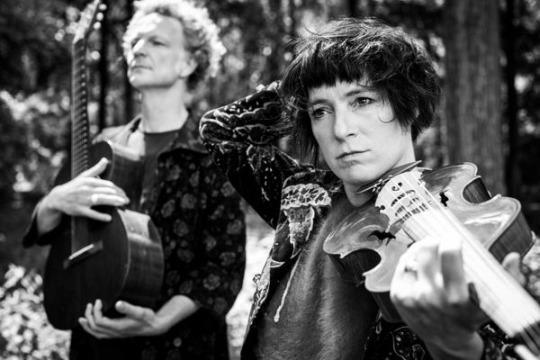|
Although the word elixir is associated oten with medicinal quackery and alchemy, its etymology resides in the Greek xerion, meaning “powder for drying wounds.” That same combination of aridity and healing is felt in the restoratives mixed by Aurélie Dorzée, Tom Theuns, and special guest Michel Massot. In their admixture of instruments both commonly (guitar, trombone, banjo, sitar) and not so commonly (nail violin, mandolauoto, alto saxhorn, sousaphone) heard, Elixir brings truth of evocation to everything these artists touch.
 Compositional credit is shared by Dorzée and Theuns as catalysts of every chemical reaction herein, starting with the “Ouverture.” As its record warps into correct speed, it serves as portal both to and from some forgotten past, setting the stage for a fantastic journey. Much of what ensues is shaded by artfully chosen colors. Between the overlay of Dorzée’s fluid, folk-inspired violin and singing to the underlay of Theuns’s sitar and mandolin, there’s more than enough to elicit fresh experiences and discoveries with each listen. All of it is held together by Massot’s sousaphone, which draws a thick and surprisingly melodic thread through the center. And while it does resort to the occasional harrumph, it’s a deeply serious player of deeply serious music. Take, for example, “La Tarantalinea” and “La Parade des Fous.” Overflowing with carnivalesque atmosphere, both end with processions into sunset yet beneath their playful exterior unravel tales of darkness and solitude.
Compositional credit is shared by Dorzée and Theuns as catalysts of every chemical reaction herein, starting with the “Ouverture.” As its record warps into correct speed, it serves as portal both to and from some forgotten past, setting the stage for a fantastic journey. Much of what ensues is shaded by artfully chosen colors. Between the overlay of Dorzée’s fluid, folk-inspired violin and singing to the underlay of Theuns’s sitar and mandolin, there’s more than enough to elicit fresh experiences and discoveries with each listen. All of it is held together by Massot’s sousaphone, which draws a thick and surprisingly melodic thread through the center. And while it does resort to the occasional harrumph, it’s a deeply serious player of deeply serious music. Take, for example, “La Tarantalinea” and “La Parade des Fous.” Overflowing with carnivalesque atmosphere, both end with processions into sunset yet beneath their playful exterior unravel tales of darkness and solitude.
The title track, morose yet bright, is emblematic of the trio’s ability to compress distant climates into a single cloud. Something that might just as easily have been born in northern highlands as in taverns of Sephardic Spain, it switches between voice and violin as might a poet between sun and moon. As in the haunting “Organetto” and “Nail Box Blues,” the latter of seemingly Asian origin, it understands that singing is the seed, not the fruit, of experience.
But while many of the base elements are drawn from ancient mines, there’s something decidedly modern about the way in which they’re presented. Not necessarily because of the music itself but because of its composers’ ability to arrange it in moving images. Indeed, the mise-en-scčne of “Mars,” “Ida,” and “Kamazurka” is decidedly cinematic. Like a soundtrack to "The Name of the Rose" as directed by Federico Fellini, it melds the medieval and the absurd without force. Other highlights in this regard include “Mae” for its bobbing bass line and chorused vocals, and “Mon Arbre” for its nourishing feel. So fear not, travelers, should your lips cross paths with this elixir, for its properties are as sound as the theme songs written to tout its riches.
Find the artists online:
Tom Theuns
Aurélie Dorzée
Michel Massot
|
